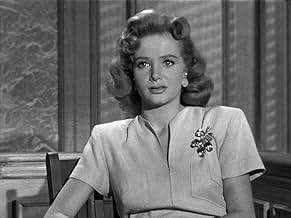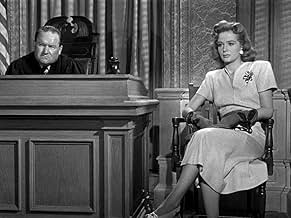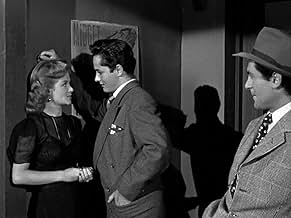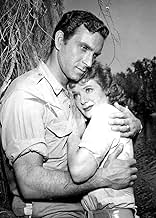Cara Williams(1925-2021)
- Actress
- Soundtrack
Perky, talented, blue-eyed redhead Cara Williams had acting aspirations from the get-go. She was born in Brooklyn on June 29, 1925, as Bernice Kamiat, to an Austrian Jewish father, Benjamin Kamiat, and a mother of Romanian Jewish descent, Flora (Schwartz). Cara began performing as a child and continued into her teens. After her parents' divorce, she relocated with her mother to Hollywood where she attended the Hollywood Professional School and lent her voice to both radio and animated cartoon shorts. At age 16 she was signed by 20th Century-Fox and began to play minor, often unbilled parts in drama, comedy and musicals billing herself as Bernice Kay.
Throughout WWII she was always reliable for adding a little pep and zing to her smallish roles. She played various shapely secretaries, salesgirls, girlfriends, etc. in such minor fodder as Wide Open Town (1941), Happy Land (1943), In the Meantime, Darling (1944) and Don Juan Quilligan (1945), but nothing to propel her into the front ranks.
Things started picking up in the post-war years. She made a splash on stage in a production of "Born Yesterday" and started earning notably feisty, tart-tongued roles in such films as Boomerang! (1947) and The Saxon Charm (1948). By the 1950s she showed scene-stealing potential in The Girl Next Door (1953) and The Helen Morgan Story (1957), and finally earned an Academy Award nomination for her sad, touching supporting turn as a widowed mother in the classic The Defiant Ones (1958) opposite Sidney Poitier and Tony Curtis. This led to a couple of flashy gangster moll roles in the film comedies Never Steal Anything Small (1959) and The Man from the Diners' Club (1963).
The sitcom December Bride (1954) starring Spring Byington had deadpan quipster Harry Morgan stealing many scenes griping about scatterbrained wife Gladys (who was never shown on camera). When Morgan moved into his own spinoff series, Gladys was finally revealed in the form of Cara on the initially popular Pete and Gladys (1960) TV show. The program did not last as long as it deserved (two seasons) but the dusky-voiced Cara came off well and was escorted directly into her own series The Cara Williams Show (1964) with the equally personable Frank Aletter at her side. Molded at this time by the CBS powers-that-be as the next wacky redhead to follow in the comedy heels of Lucille Ball, the plans quickly went askew following an unfavorable network power shuffle and the canceling of her sitcom after only one season. With her momentum completely gone, her career went into rapid decline. She did manage a steady role on the first season of Rhoda (1974), and an affecting dramatic turn in the ensemble film soaper Doctors' Wives (1971). By the 1980s, however, she had officially retired.
A turbulent 1950s marriage to actor John Drew Barrymore (who later became the father of actress Drew in a subsequent marriage) produced son John Blyth Barrymore who went into acting as well and appeared in a bit role in his mother's last film The One Man Jury (1978). Cara subsequently married a Beverly Hills realtor (her third husband) and later displayed a strong business acumen in interior designing and as a champion poker player. She also had one child from her first marriage.
Throughout WWII she was always reliable for adding a little pep and zing to her smallish roles. She played various shapely secretaries, salesgirls, girlfriends, etc. in such minor fodder as Wide Open Town (1941), Happy Land (1943), In the Meantime, Darling (1944) and Don Juan Quilligan (1945), but nothing to propel her into the front ranks.
Things started picking up in the post-war years. She made a splash on stage in a production of "Born Yesterday" and started earning notably feisty, tart-tongued roles in such films as Boomerang! (1947) and The Saxon Charm (1948). By the 1950s she showed scene-stealing potential in The Girl Next Door (1953) and The Helen Morgan Story (1957), and finally earned an Academy Award nomination for her sad, touching supporting turn as a widowed mother in the classic The Defiant Ones (1958) opposite Sidney Poitier and Tony Curtis. This led to a couple of flashy gangster moll roles in the film comedies Never Steal Anything Small (1959) and The Man from the Diners' Club (1963).
The sitcom December Bride (1954) starring Spring Byington had deadpan quipster Harry Morgan stealing many scenes griping about scatterbrained wife Gladys (who was never shown on camera). When Morgan moved into his own spinoff series, Gladys was finally revealed in the form of Cara on the initially popular Pete and Gladys (1960) TV show. The program did not last as long as it deserved (two seasons) but the dusky-voiced Cara came off well and was escorted directly into her own series The Cara Williams Show (1964) with the equally personable Frank Aletter at her side. Molded at this time by the CBS powers-that-be as the next wacky redhead to follow in the comedy heels of Lucille Ball, the plans quickly went askew following an unfavorable network power shuffle and the canceling of her sitcom after only one season. With her momentum completely gone, her career went into rapid decline. She did manage a steady role on the first season of Rhoda (1974), and an affecting dramatic turn in the ensemble film soaper Doctors' Wives (1971). By the 1980s, however, she had officially retired.
A turbulent 1950s marriage to actor John Drew Barrymore (who later became the father of actress Drew in a subsequent marriage) produced son John Blyth Barrymore who went into acting as well and appeared in a bit role in his mother's last film The One Man Jury (1978). Cara subsequently married a Beverly Hills realtor (her third husband) and later displayed a strong business acumen in interior designing and as a champion poker player. She also had one child from her first marriage.





























